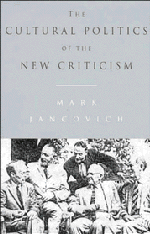Book contents
- Frontmatter
- Contents
- Preface
- List of abbreviations
- Part I The New Criticism and its critics
- Part II The formation of the New Criticism
- Introduction
- 4 John Crowe Ransom: the social relations of aesthetic activity
- 5 Allen Tate: the social organization of literature
- 6 Robert Penn Warren: against propaganda and irresponsibility
- Conclusion: the analysis of a Southern poet
- Part III The establishment of the New Criticism
- Part IV The development of the New Criticism
- Conclusion: Modernism and postmodernism within the American academy
- Conclusion
- Notes
- Bibliography
- Index
Conclusion: the analysis of a Southern poet
Published online by Cambridge University Press: 18 December 2009
- Frontmatter
- Contents
- Preface
- List of abbreviations
- Part I The New Criticism and its critics
- Part II The formation of the New Criticism
- Introduction
- 4 John Crowe Ransom: the social relations of aesthetic activity
- 5 Allen Tate: the social organization of literature
- 6 Robert Penn Warren: against propaganda and irresponsibility
- Conclusion: the analysis of a Southern poet
- Part III The establishment of the New Criticism
- Part IV The development of the New Criticism
- Conclusion: Modernism and postmodernism within the American academy
- Conclusion
- Notes
- Bibliography
- Index
Summary
One way of considering the relationship between literary and social criticism in the writing of Ransom, Tate and Warren is to examine the essays on Sidney Lanier which they published during the first half of the 1930s. These essays examined the relationship between three aspects of Lanier's writing: his status as a Southerner who had lived through the Civil War and its aftermath; the social and political positions which he took in relation to these events and processes; and the form of poetry which he developed. In the process, each of them claimed that his poetry was poor, and that its lack of quality was related to his social and political positions, but they did not see this relationship as one of direct reflection or expression. Instead, these weaknesses were seen to be the result of a common problem. Lanier was unable to consider social and poetic forms with any degree of rigour. He relied on abstractions which he failed to examine. The result was a limited understanding of both literary and social forms.
Tate's essay, ‘A Southern Romantic’, was the first of the three to be published, and it considers Aubrey Starke's biography of Lanier. In opposition to Starke's defence of Lanier, it claims that Lanier's reputation as a poet was not based on a critical evaluation of his poetry or ideas, but on his claim to historical significance.
- Type
- Chapter
- Information
- The Cultural Politics of the New Criticism , pp. 63 - 66Publisher: Cambridge University PressPrint publication year: 1993



